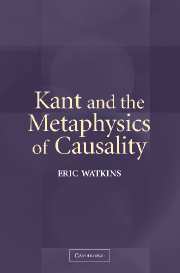Book contents
4 - Kant's Model of Causality
Published online by Cambridge University Press: 12 January 2010
Summary
INTRODUCTION
Most commentators on Kant's views on causality have presupposed, whether explicitly or implicitly, that Kant adopts Hume's model of causality, according to which one determinate event (e.g., the motion of one billiard ball at one moment in time) causes another determinate event (e.g., the motion of a second billiard ball at a later moment in time). If pressed, they could cite several reasons in support of such a presupposition. First, if Kant were to employ a model that displayed significant differences from Hume's, how could he possibly hope to refute Hume's position without begging the question? Second, in light of the widespread success of Newtonian physics at the time, it might have seemed that science would require nothing more than causal laws that describe which events follow which other events. Third, this presupposition is apparently backed up by textual evidence from the Prolegomena, where Kant famously asserts (4:260) that it was Hume who first awoke him from his dogmatic slumber and, for that matter, precisely on the issue of causality.
If Kant were committed to causality being a relation between events, then the main relevant difference between Kant's and Hume's models of causality would be that Kant accepts, whereas Hume rejects, the idea that these relations are necessary and universal. Accordingly, commentators have focused their attention first and foremost on whether or not a justification can be found for accepting Kant's more ambitious claim. Moreover, their focus could easily appear to be perfectly consistent with the apparent intent of Kant's argument in the Second Analogy, since, if successful, it establishes that the temporal determination of events, which Hume mistakenly took to be unproblematic, actually presupposes causal rules of the sort Hume wanted to deny.
- Type
- Chapter
- Information
- Kant and the Metaphysics of Causality , pp. 230 - 298Publisher: Cambridge University PressPrint publication year: 2004



